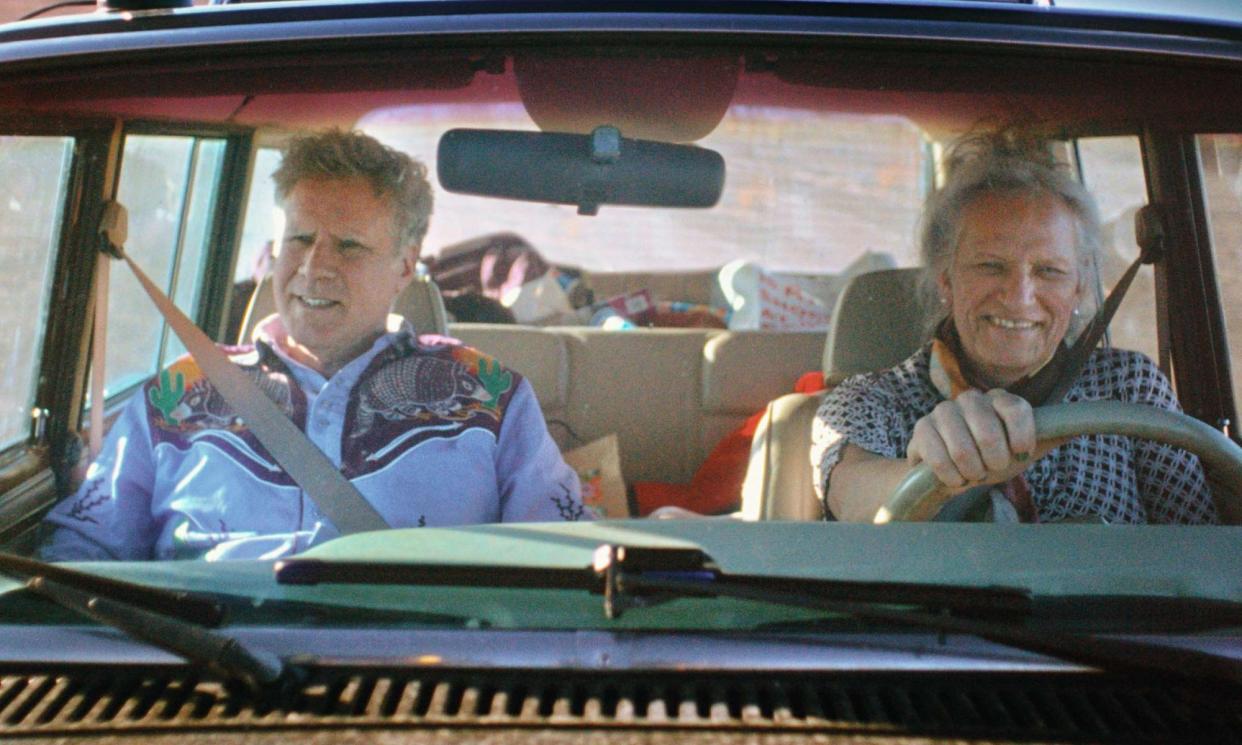Will & Harper review – Will Ferrell’s charming trans road trip documentary

The crowd-pleasing gloss of slickly made documentary Will & Harper, premiering to the kind of intense enthusiasm most market titles here would dream of (multiple standing ovations after; laughter, tears and applause during), is both blessing and curse. The film, which follows Will Ferrell as he goes on a road trip with an old SNL friend who has recently transitioned, is told on a grand scale, looking like a narrative studio movie and punctuated with celebrity cameos, and aims to add dimension to an experience most mainstream audiences still know very little about. It’s effective too, working as both buddy comedy and much-needed act of public service.
Related: Rob Peace review – Chiwetel Ejiofor’s moving fact-based tragedy
But sometimes the lines between fact and fiction get a little blurry, those involved with the film a little too self-aware of their wide audience, moments of genuinely gut-wrenching poignance running up against moments of genuinely jarring artifice. The director, Josh Greenbaum, who has directed broad studio comedies before like Barb and Star Go to Vista del Mar and Strays, can sometimes over-orchestrate, laying on a score that feels too big or constructing a moment that feels too pre-planned. It’s a difficult balance, especially when your two leads work in comedy, and it’s not something the film itself doesn’t wrestle with, the very notion of an A-list movie star travelling across the US with a camera crew an unnatural thing.
Ferrell and comedy writer Harper Steele have been friends for decades but since she transitioned, they haven’t spent a great deal of time together. Both have wondered how to handle what their friendship now is, whether major changes are needed, how to act, what to ask, what not to ask, etc. Steele, living in upstate New York but born in Iowa, is also curious about how her life plays out now outside of her comfort zone, how difficult things might be for her in states where both legally and socially, she is considered less of a human. Her body has changed but her tastes haven’t – she likes shitty beer and sport and dodgy bars and doesn’t want to feel like she can’t be herself in places she used to frequent. So the two decide to drive from New York to Los Angeles, taking in pieces of Americana on the way, a process of discovery not just of the country they live in but also of the relationship they now have.
It’s a generous, sensitive study of allyship and what that really means in the day-to-day with Ferrell working out in different, often potentially dangerous, situations how to do the right thing. His presence is something of a buffer for Steele, in ways that help but often hinder (she later takes time to go inside bars and stores without him) as Ferrell is a magnet for attention, something he encourages and something that can have a disruptive and harmful effect.
A skin-crawling realisation has the pair googling a governor after indulging in photo ops with him only to find out he has a repulsive history of transphobic views. Soon after a seat-edge scene of the pair at a rural bar, complete with Confederate and Trump flags on the wall, ends up going better than expected, the film crashes us down to Earth with a deeply unsettling sequence in Texas. Ferrell decides to wear a Sherlock Holmes outfit for dinner, loudly courting fans, as the two attempt a steak challenge in a busy restaurant. The attention they then receive is, quite obviously, of the vilest kind and Ferrell breaks down the morning after, horrified by what he did and didn’t do, a humbling moment of self-realisation we rarely see from someone with such fame.
But while it is a story about how to support and sustain someone as an ally, it’s not Ferrell’s story to tell and he wisely takes a backseat to listen to his friend. Some of these journal readings and memories start out as contrived insertions but Steele’s story has considerable power and it’s one we just don’t hear enough, detailing the messiness of what coming to terms with your gender identity late in life means. She’s specific and unfiltered and heart-breaking, remembering the mechanics of suicide attempts and of a rundown remote house she once bought just to find somewhere to privately be herself. Their journey is a reminder of the beauty of the US landscape but also the ugliness alongside and as much as the film traffics in road trip cliches – throwback soundtrack and all – it comes with a cautionary prod to many, that the freedom of the open road comes with caveats for others.
There are enough earned moments of piercing sadness and shaggy humour that those that feel more engineered can distract, the film trying to force itself into the structure of something it doesn’t need to be, pushing us away just after we’ve been pulled in close. The bigger flourishes (the film feels like it could be a major play for a buyer like Searchlight as both box office sleeper and awards contender) will surely help it to reach and educate a wider audience and they don’t all misfire but Will & Harper is best when it feels and looks smaller, the intimate story of two friends trying to navigate their way through something together without the assurance of a Hollywood ending.
Will & Harper is showing at the Sundance film festival and is seeking distribution

 Yahoo Movies
Yahoo Movies 
